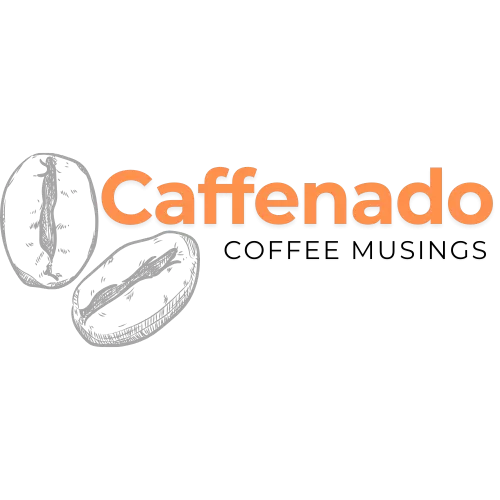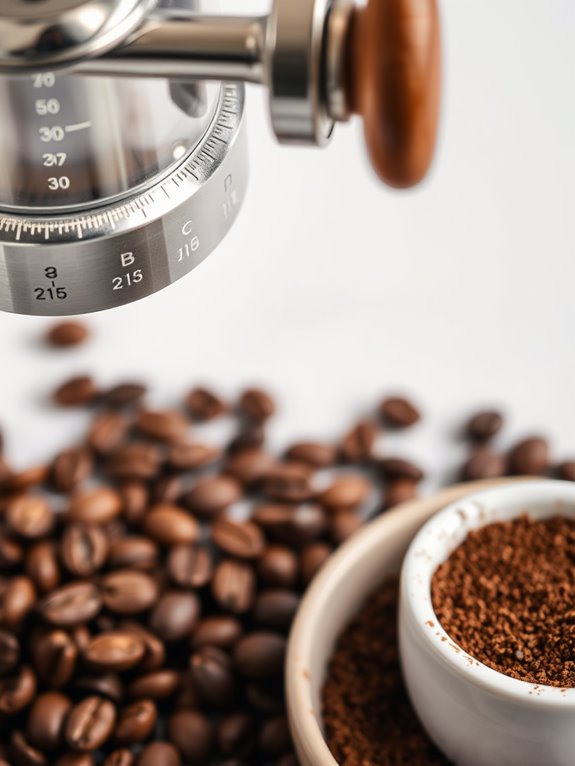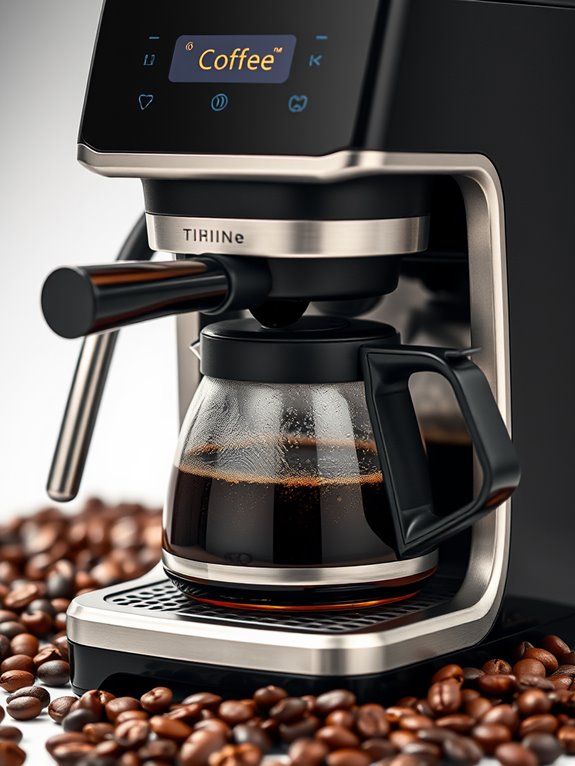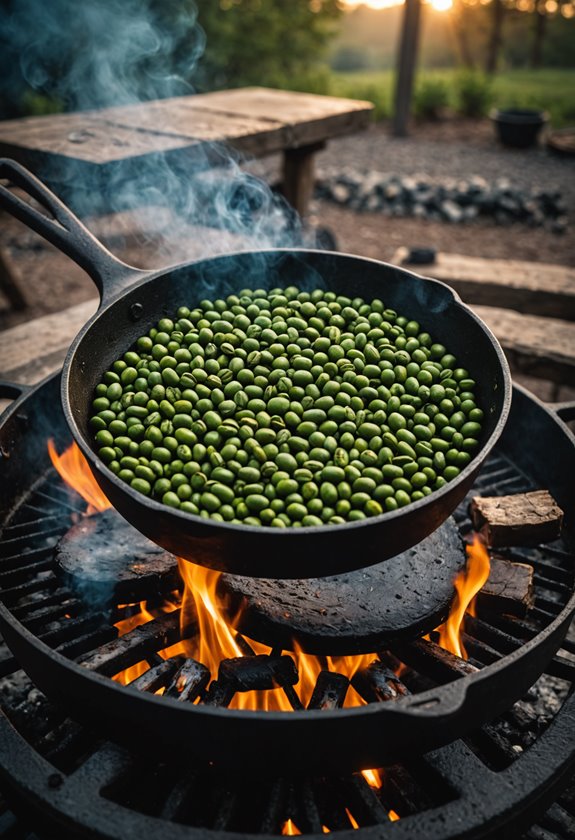Which Is Cheaper, Coffee Beans or Ground Coffee?
When it comes to cost, whole coffee beans are usually cheaper than ground coffee, often saving you 20-30% per pound. Let's investigate why. Whole beans range from $10-$15 a pound, while ground coffee costs $12-$18. Although buying whole beans requires a grinder, you'll enjoy long-term savings and better flavor. Freshly grinding your beans preserves their aroma and taste, unlike ground coffee, which loses quality through oxidation. Additionally, buying beans in bulk further reduces your cost per cup, while subscription services might offer extra discounts. By understanding these factors, you can make a choice that balances cost and quality.
Key Takeaways
- Whole beans are generally 20-30% cheaper than pre-ground coffee.
- Bulk buying options for whole beans reduce the cost per cup significantly.
- Whole beans have fewer packaging costs, making them more economical long-term.
- Subscription services for whole beans offer additional savings compared to ground coffee.
- Ground coffee's convenience comes with a higher price due to packaging and processing.
Coffee Beans vs. Ground Coffee
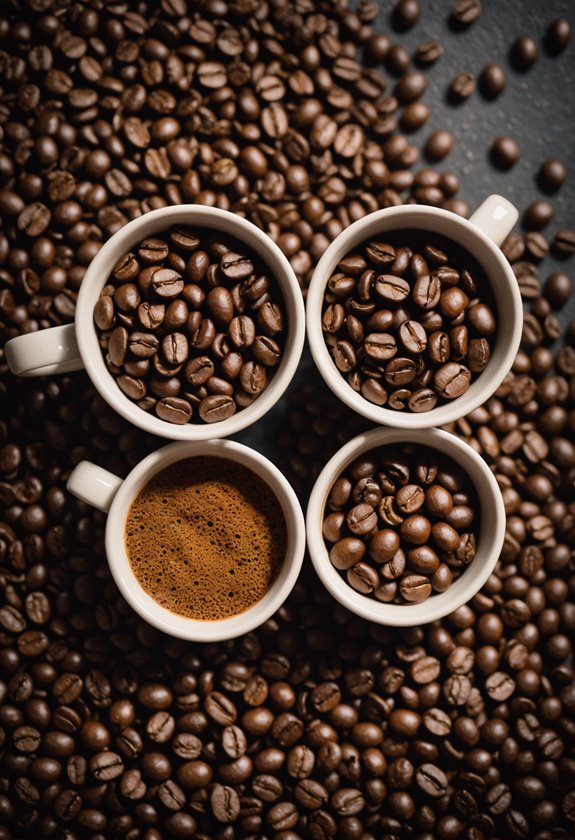
When deciding between coffee beans and ground coffee, it's important to contemplate both cost and quality.
Let's investigate how choosing to buy whole beans can enhance your coffee experience. Whole beans generally cost less, around $10-$15 per pound, compared to ground coffee's $12-$18 per pound. Though whole beans might seem more expensive upfront, they often offer better value per cup, especially if you brew your coffee at home frequently. Proper storage methods help whole beans maintain their freshness significantly longer than ground coffee.
Whole beans provide the taste and aroma that many coffee lovers crave. By grinding beans yourself, you guarantee your coffee is freshly ground, preserving the flavour and quality that can diminish in pre-ground options. This practice can save money over time, as buying in bulk reduces the overall cost per cup. Additionally, whole beans are sourced from superior crops, contributing to a more flavorful brew.
Ground coffee, while convenient, often comes with a trade-off in taste and quality. Its shorter shelf life and flavor degradation can lead to repeated purchases.
Therefore, investing in whole beans not only enhances your coffee experience but also proves cost-effective in the long run, despite the initial price tags.
Premium brands like Lavazza Super Crema offer light-medium roasts that are particularly suitable for those who prefer a milder, aromatic coffee experience.
Factors Influencing Price
Now that you've considered the differences between coffee beans and ground coffee, let's investigate what affects their prices. Whole beans generally range from $10-$15 per pound, while ground coffee costs between $12-$18 per pound. This means whole beans might save you money per cup when brewed at home. But many factors play into these numbers.
Quality and Flavor Profiles
The quality of whole beans directly impacts their price. Premium varieties with superior flavor profiles often cost more. Coffee lovers who prioritize taste might find these worth the extra expense. Eight O'Clock Coffee offers rich and robust flavors in a large 40-ounce bag that provides excellent value.
Grinding whole beans at home preserves freshness, enhancing both flavor and savings by reducing frequent purchases. High-quality beans like Lavazza Top Class offer rich chocolate and hazelnut notes that justify their premium pricing.
Market Conditions and Consumer Demand****
Market conditions notably influence prices. Consumer demand can cause fluctuations in the cost of both whole beans and ground coffee. When demand spikes, prices may rise, affecting your purchase decisions.
Bulk Purchasing and Savings
Buying whole beans in bulk can offer additional savings. Larger purchases often reduce the cost per pound, making it a smart choice for those who enjoy brewing at home regularly.
This strategy not only cuts costs but also guarantees a steady supply for your morning coffee ritual.
Short-Term Cost Analysis
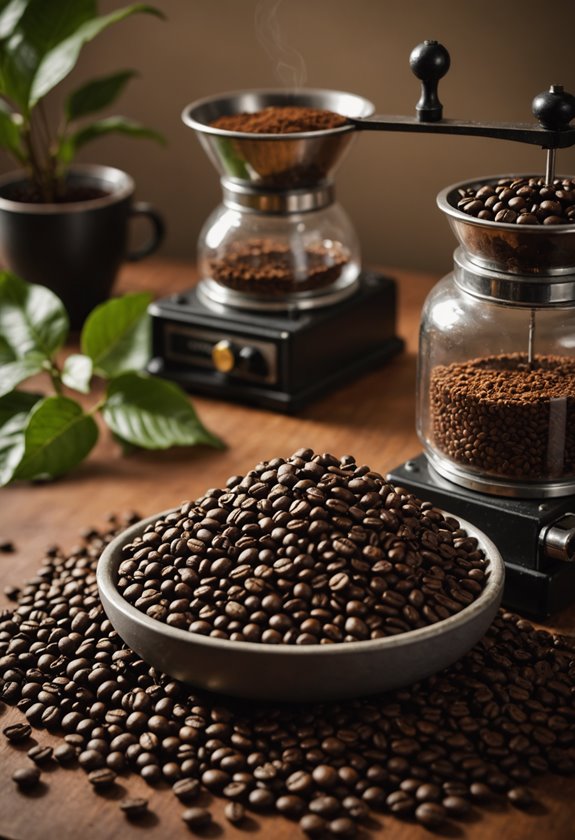
Examining the short-term costs of coffee, you'll find that whole beans and ground coffee present different financial variables. Whole beans typically have a higher upfront cost, ranging from $10 to $15 per pound, while ground coffee varies from $12 to $18 per pound.
Despite this, brewing at home with whole beans can be cheaper per cup for regular coffee drinkers. When you grind your own beans, you not only enjoy enhanced flavor and freshness but also contribute to long-term savings. This is because you won't need to continuously purchase pre-ground coffee.
Upfront Costs and Bulk Purchasing
Let's investigate how whole beans can actually save you money in the short term. While you pay more upfront, buying in bulk can decrease the cost considerably.
This means fewer trips to the store and more savings when compared to frequently buying pre-ground coffee. Bulk purchasing also allows you to stock up on whole beans, ensuring you have fresh coffee available without the hassle of constant shopping.
Long-Term Savings Potential
While upfront costs and bulk purchasing offer immediate benefits, the long-term savings potential of whole beans eclipses these initial advantages. Whole beans, typically cheaper at $10 to $15 per pound compared to ground coffee's $12 to $18, provide a significant cost-effective option if you frequently brew coffee.
By choosing to buy in bulk, you can further reduce the price per cup, making it an economical choice over time.
Grinding coffee at home is another way to maximize savings. Although the initial investment in a quality grinder might seem steep, it pays off in the long run. By grinding your own coffee, you control the grind size, which caters to different brewing methods and enhances both flavor and aroma.
This not only improves coffee quality but also minimizes waste, contributing to long-term savings.
Let's examine how purchasing whole beans allows for greater flexibility and savings. By buying in bulk and grinding at home, you effectively lower costs over time.
The ability to customize your coffee experience, from grind size to brewing method, guarantees that you can enjoy a superior cup of coffee, all while being mindful of your budget.
Flavor and Freshness Impact
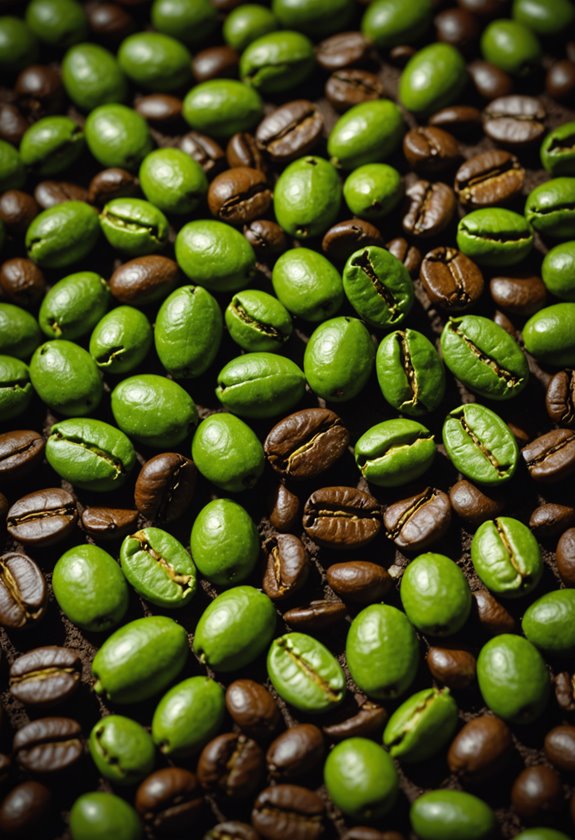
When it comes to flavor and freshness, whole beans clearly outperform ground coffee. The magic happens when you grind beans just before the brewing process. This guarantees a freshly ground, aromatic experience that ground coffee simply can't match.
Oxidation, which starts as soon as beans are ground, diminishes flavor and freshness, making whole beans the superior choice for maintaining quality over time.
Whole beans allow you to customize the grind size to fit your brewing method, whether it's espresso or French press. This flexibility lets you optimize the extraction process, resulting in a cup of coffee with superior quality and taste.
Ground coffee, on the other hand, often comes in one standard grind size, limiting your ability to tailor your brewing process.
Consider these benefits of choosing whole beans:
- Flavor Preservation: Whole beans maintain their flavor integrity for at least two weeks, offering a consistently fresh taste.
- Aromatic Experience: Freshly ground coffee from whole beans provides a richer aromatic experience, enhancing your enjoyment.
- Grind Customization: Adjusting grind size for different brewing methods maximizes flavor extraction, providing a more personalized coffee experience.
Let's investigate how whole beans offer a pleasing, flavorful adventure every time you brew.
Smart Buying Tips
Understanding that whole beans deliver superior flavor and freshness, you might wonder how to make this option more cost-effective.
Let's investigate smart buying tips that can help you enjoy your coffee while keeping costs down.
Bulk Purchases and Local Roasters****
Buying coffee in bulk can save you money. Whole beans generally cost $10-$15 per pound, whereas ground coffee averages $12-$18.
Consider purchasing whole beans directly from local roasters or online. They often offer competitive pricing and sales, reducing your overall costs.
Subscription Services
Subscription services are another way to secure savings. By subscribing, you can benefit from discounts and guarantee a steady supply of fresh whole beans.
This approach not only saves money but also eliminates the hassle of frequent trips to the store.
Invest in a Quality Grinder****
Investing in a quality grinder can enhance your brewing experience.
With a grinder, you can customize the grind size to maximize flavor. This can lead to fewer coffee purchases as you extract more flavor from each batch, ultimately reducing the cost per cup.
Frequently Asked Questions
Is It Cheaper to Buy Coffee Beans Than Ground?
You're wondering about the cost difference. Buying whole beans is generally cheaper per pound. Even though they require grinding, they offer better long-term value due to bulk discounts, freshness, and lower cost per cup when brewed.
Does 1 Tablespoon of Coffee Beans Equal 1 Tablespoon of Ground Coffee?
No, 1 tablespoon of coffee beans doesn't equal 1 tablespoon of ground coffee. When you grind beans, they expand in volume. It's better to measure by weight for accuracy, as density differences can affect your brewing results.
What Lasts Longer Coffee Beans or Ground Coffee?
You'll find that coffee beans last longer than ground coffee. Whole beans resist oxygen, moisture, and light better, preserving freshness and flavor. Properly stored, they'll stay fresh for months, while ground coffee loses quality in mere days.
Do You Save Money Buying Coffee Beans?
You save money by buying coffee beans because they last longer and maintain freshness, reducing the need for frequent purchases. Grinding at home lets you buy in bulk, customize your brew, and minimize waste.
Conclusion
Ultimately, whether coffee beans or ground coffee is cheaper depends on your priorities. If you value freshness and flavor, investing in coffee beans could save you money in the long run, as they stay fresh longer. On the other hand, if convenience is your priority, ground coffee might be more cost-effective short-term. Consider factors like storage options and brewing preferences. By balancing these aspects, you'll make an informed decision that suits your taste and budget.
